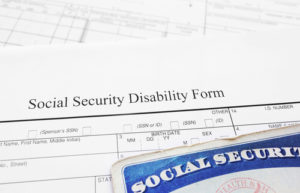
Written By: Senior Disability Attorney, Philip D. Ryan
As a social security disability attorney, I try to never lose sight of the fact that individuals seeking disability benefits are going through an extremely anxious time. Most people seeking disability benefits have little to no experience with the social security system. Most have never been to a disability hearing (or for that matter to any type of court proceeding). In fact, most of my clients never had an occasion to hire (or even meet) a lawyer before contacting Ryan Bisher Ryan & Simons for assistance with their disability claim. And now they have an additional factor increasing their anxiety, the COVID-19 pandemic. One of the most common questions I’ve received since the beginning of the COVID-19 crisis is whether the pandemic will cause their disability hearing to be delayed.
Without a doubt, the COVID-19 pandemic caused an upheaval in the practice and procedures relating to social security disability claims. In the State of Oklahoma, “in-person” disability hearings are normally conducted before administrative law judges (ALJ’s) in Oklahoma City, Tulsa, McAlester, and occasionally, Lawton, Oklahoma. However, all hearing offices (referred to as the Office of Hearings Operations, or OHO) were closed in March 2020 due to the pandemic, and have yet to reopen. The closure of these offices initially led to the cancellation of several of my clients’ hearings. However, shortly thereafter, OHO obtained the necessary technology to allow ALJs and their support staff to work from home.
This, in turn, has allowed for hearings to resume via telephone.
Do Social Security Disability Applicants Have a Choice to Decline a Telephone Hearing?
Disability applicants do have the option of declining a hearing via telephone. However, declining a telephone hearing will result in the applicant’s hearing being delayed until the OHO’s reopen. How long will it take for the OHO’s to reopen? No one knows for sure, but to date, it appears that no “in-person” hearings will be scheduled until at least October 2020. Consequently, from my standpoint, I believe it is wise to proceed with telephone hearings. While there are a few disadvantages of proceeding in this manner, there are also certain advantages. Ultimately, I leave this decision to accept or decline a telephone hearing to my client; however, at this point, not a single client of Ryan Bisher Ryan & Simons has opted to wait the additional time for an “in-person” hearing.
As noted, there are some advantages to conducting hearings by telephone. Such as;
- Traveling to an OHO for a hearing involved substantial travel time for my clients. Obviously, with a telephone hearing, the disability applicant does not have to travel to the OHO for their hearing.
- Likewise, there are no issues with parking or walking to the hearing office once parked. While this might be a minor inconvenience for some people, finding a parking spot and walking from that parking spot (especially in Oklahoma City and Tulsa) is often problematic for disability applicants with limited mobility.
- Conducting a hearing by telephone also means the disability applicant will not be required to spend long periods of time in an uncomfortable waiting room at the OHO. Although disability hearings are scheduled for specific times, it is not unusual for an ALJ to run behind. This often resulted in long waits at the OHO offices that again were often problematic for disability applicants with physical infirmities.
What is a Telephone SSDI Hearing Like?
Procedurally, a telephone hearing is not much different than an “in-person” hearing. Every ALJ has a hearing reporter that assists with the technical aspects of a case (ensuring that the hearing is digitally recorded, that the evidence is exhibited, the witnesses are sworn, etc.). In telephone hearings, the hearing reporter has the additional duty of contacting all the parties (the ALJ, attorney, client, and any expert witnesses) and “conferencing” them into the call.
Once everyone is on the line, the judge will announce that they are formally commencing the hearing. The ALJ will also confirm that neither the disability applicant nor their attorney objects to conducting the hearing by telephone. The ALJ will also confirm that no one (other than the hearing reporter) is recording the hearing.
Additionally, the ALJ will ask that both the disability applicant and the attorney participate in the hearing from a location where they are the only ones in the room. Other than these initial tasks, the rest of the hearing typically follows the ALJ’s usual format for “in-person” hearings. Occasionally, a technical issue arises (someone is dropped off the call) but in those instances, the ALJ will temporarily “go off the record” until the issue is resolved.
In the last three months, I have participated in approximately one hundred telephone hearings and to date, any technical difficulties have been few and far between.
Why an SSI or SSDI Lawyer is Still Necessary
Still, most disability applicants will find participating in a legal proceeding over the telephone, with a judge the disability applicant has never met, or even seen, intimidating. Hopefully, I am able to assist my clients with this apprehensiveness. In most cases, the ALJs on my telephone hearings are judges that I have appeared in front of literally hundreds of times.
This allows me to provide my clients with at least some information about the ALJs general procedure, questioning styles, and even likes and dislikes. It has been my experience that my clients find this knowledge reassuring as again in my opinion much of the anxiety disability applicants encounter before a hearing is a fear of the “unknown”.
We can also assist with SSDI denials and appeals if you have already started the SSDI process and are having trouble getting the amount of coverage you need to get by.
If you would like additional information regarding social security telephone hearings, or if you have any other questions regarding social security disability, please feel free to contact Ryan Bisher Ryan and Simons at 1.888.725.2222 or visit our website at www.rbrlawfirm.com.


